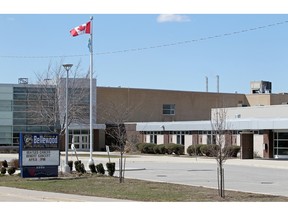
Article content
Five Windsor elementary schools made the top 25 per cent of the Fraser Institute’s rankings based on standardized testing results in 2022.
Article content
The institute, which describes itself as a libertarian-conservative Canadian public policy think-tank, compiled results of elementary school performance based on results of testing from the Education Quality and Accountability Office, a Crown agency of the government of Ontario.
Advertisement 2
Article content
“Our report cards offer parents information they can’t easily get anywhere else, about how their child’s school performs and how it compares to other schools in Ontario,” Peter Cowley, a Fraser Institute senior fellow, wrote in a release.
The institute ranked 2,975 public, Catholic, and independent schools based on nine academic indicators derived from provincewide test results.
“It doesn’t matter where a school is ranked, or what challenges its students may face. The evidence is clear — all types of schools, located all over the province with different types of students, are all capable of improvement,” Cowley wrote.
The city’s top-rated school, Bellewood Public School, ranked 87th.
The rankings assign a school performance number based on the results. Bellewood’s scores have ranged from 8.7 to 9.3 out of 10 from 2016 to 2022.
In an interview, Cowley said the rankings allow parents to challenge their children’s schools to improve and encourage communications among school principals to share ideas on how to progress.
“Parents would be able to talk to the principal and say you know what, we’re not doing very well in history and I think at the school down the way continues to do good work in terms of history and the final exams,” Cowley said. “So the question is, ‘What do they do over there that enables them to do better than us?’”
Article content
Advertisement 3
Article content
Other local schools in the top quarter of the rankings are St. Rose Catholic School (No. 443), St. Anne French Immersion Catholic School (486), École élémentaire catholique Monseigneur Jean Noël (580), and Our Lady of Mount Carmel Catholic School (626).
The tests measured students in grades three and six in reading, writing and math.
But the Fraser Institute’s rankings have little impact on local school boards, spokespersons for the public and Catholic boards say.
Ranking schools was not what standardized testing was created for, and comparisons between schools are unsound because of the vast array of challenges each school faces, spokespersons for the two boards say.
Since test results are available to education administrators well before the Fraser Institute releases its rankings, officials are already well down the path of identifying which schools can benefit from an investment of resources, officials say.
“We do not believe in ranking or embarrassing schools in an attempt to motivate improved performance,” Scott Scantlebury, public relations officer at Greater Essex County District School Board, said in an email to the Windsor Star.
Advertisement 4
Article content
“We are, of course, aware of the rankings, but do not consider them productive to our purposes.”
While the Fraser Institute reports “endorse comparisons and support competition as fundamental to the improvement process … the GECDSB uses a variety of data, analysis and continuous reflection to determine professional judgment, which guides our actions to best meet the needs of individual students,” he wrote.
“Many questions must be asked to determine the complete story.”
Fulvio Valentinis, chair of the Windsor-Essex Catholic District School Board, echoed those sentiments.
“We always look at what comes out (in the rankings), but we don’t compare because every school’s different and when schools are struggling or are more challenged, we look to see if we could address what are the issues that we need to look at,” he said.
Trustees do look at how the school board compares to the provincial average, and administration looks at EQAO results to see where resources need to be directed, he said.
Stephen Fields, communications co-ordinator with the Catholic board, said rankings and school comparisons are not the purpose for the EQAO testing.
Advertisement 5
Article content
“We do take a look at the results to see how we’re doing against, perhaps similar-size school boards around the province,” he said.
“The whole purpose of the EQAO testing is to provide school boards, as well as the province, with an indication of how students are doing in terms of meeting provincial curriculum expectations.
“The data that’s gleaned from those assessments … is used by school board administrators as well as support staff to identify those schools that might benefit from some additional support to make sure that students will eventually meet those expectations.”
The testing helps to identify “those schools that might need additional supports so that we can make sure that as students are moving through their grades that they are, in fact meeting those curriculum expectations by the time they graduate.”
Article content



